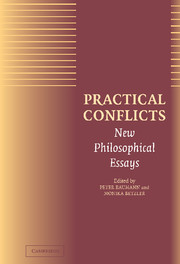Book contents
- Frontmatter
- Contents
- Foreword
- 1 Introduction: Varieties of Practical Conflict and the Scope of Practical Reason
- 2 Willing the Law
- 3 The Myth of Egoism
- 4 Thinking about Conflicts of Desire
- 5 Putting Together Morality and Well-Being
- 6 The Second Worst in Practical Conflict
- 7 Personal Practical Conflicts
- 8 Sources of Practical Conflicts and Reasons for Regret
- 9 Conflicting Values and Conflicting Virtues
- 10 Involvement and Detachment: A Paradox of Practical Reason
- 11 Outcomes of Internal Conflicts in the Sphere of Akrasia and Self-Control
- 12 Are There Insolvable Moral Conflicts?
- 13 Moral Dilemmas of Transitional Justice
- 14 Do Conflicts Make Us Free?
- List of Contributors
- Name Index
- Subject Index
- References
13 - Moral Dilemmas of Transitional Justice
Published online by Cambridge University Press: 02 December 2009
- Frontmatter
- Contents
- Foreword
- 1 Introduction: Varieties of Practical Conflict and the Scope of Practical Reason
- 2 Willing the Law
- 3 The Myth of Egoism
- 4 Thinking about Conflicts of Desire
- 5 Putting Together Morality and Well-Being
- 6 The Second Worst in Practical Conflict
- 7 Personal Practical Conflicts
- 8 Sources of Practical Conflicts and Reasons for Regret
- 9 Conflicting Values and Conflicting Virtues
- 10 Involvement and Detachment: A Paradox of Practical Reason
- 11 Outcomes of Internal Conflicts in the Sphere of Akrasia and Self-Control
- 12 Are There Insolvable Moral Conflicts?
- 13 Moral Dilemmas of Transitional Justice
- 14 Do Conflicts Make Us Free?
- List of Contributors
- Name Index
- Subject Index
- References
Summary
“Transitional justice” refers to the process of coming to terms with the past in the transition to democracy. It includes, notably, trials, administrative and professional purges, restitution of property, and compensation for suffering. Notable examples of transitions to democracy that had some measure of transitional justice include
the demise of the Athenian oligarchs in 411 and then again in 403 b.c.;
the restoration of democracy after 1945 in countries that had been occupied by the Germans during World War II;
the return to or introduction of democracy after 1945 in the main Axis countries: Germany, Japan, Italy;
the fall of military dictatorships in Southern Europe in the mid-1970s;
the return to or introduction of democracy after 1989 in numerous countries in Eastern Europe;
the recent fall of the dictatorships in many Latin American countries, notably, Argentina, Chile, and Bolivia; and
the transition to democracy in South Africa.
These cases pose some extraordinary hard and sometimes unusual moral questions, for which we often lack firm intuitions. Here is a preliminary example: Among the agents of the Nazi or Communist regime, should the fanatic or the opportunist be punished more severely? In other words, is the personal commitment to an inhumane ideology an aggravating or an extenuating circumstance? In the fourth Provinciale, Pascal heaps scorn on the Jesuits, who teach that one cannot sin if one does not know that what one is doing is wrong.
- Type
- Chapter
- Information
- Practical ConflictsNew Philosophical Essays, pp. 295 - 315Publisher: Cambridge University PressPrint publication year: 2004
References
- 7
- Cited by



